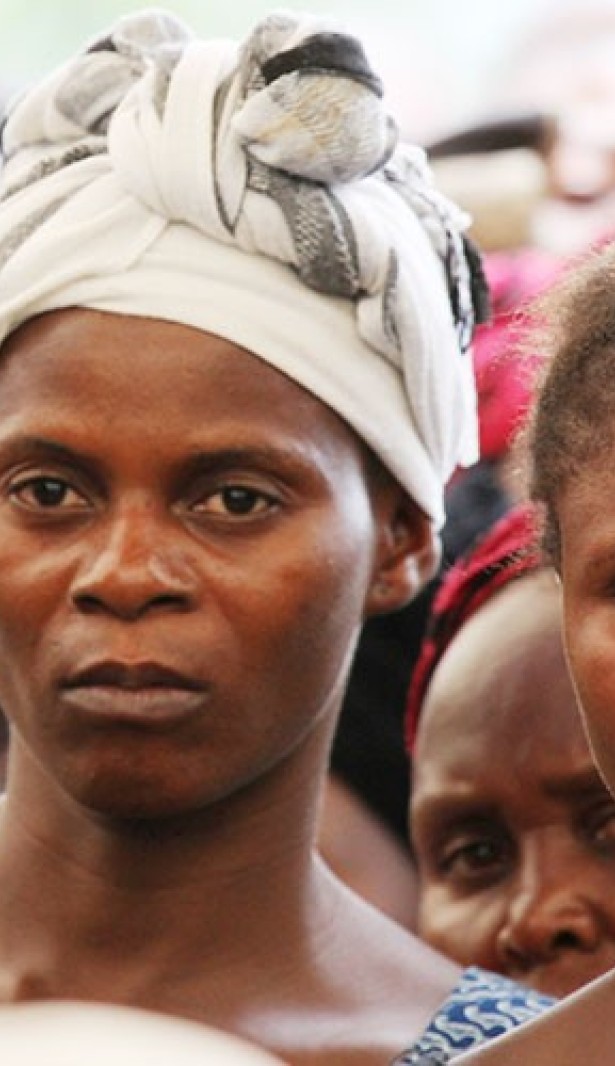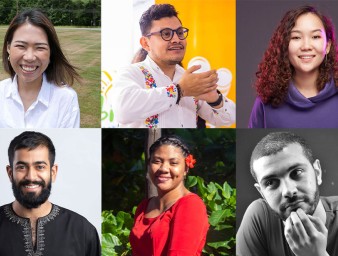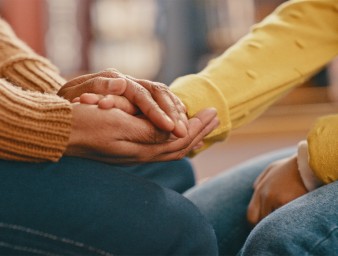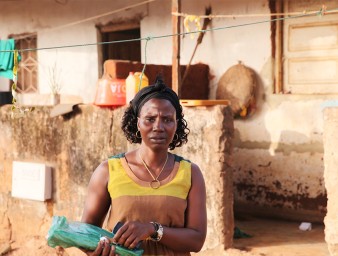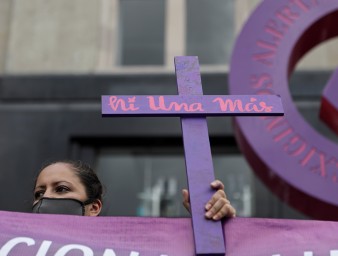Sexual violence victims in Ituri’s conflict find a place for healing and justice
30 July 2020
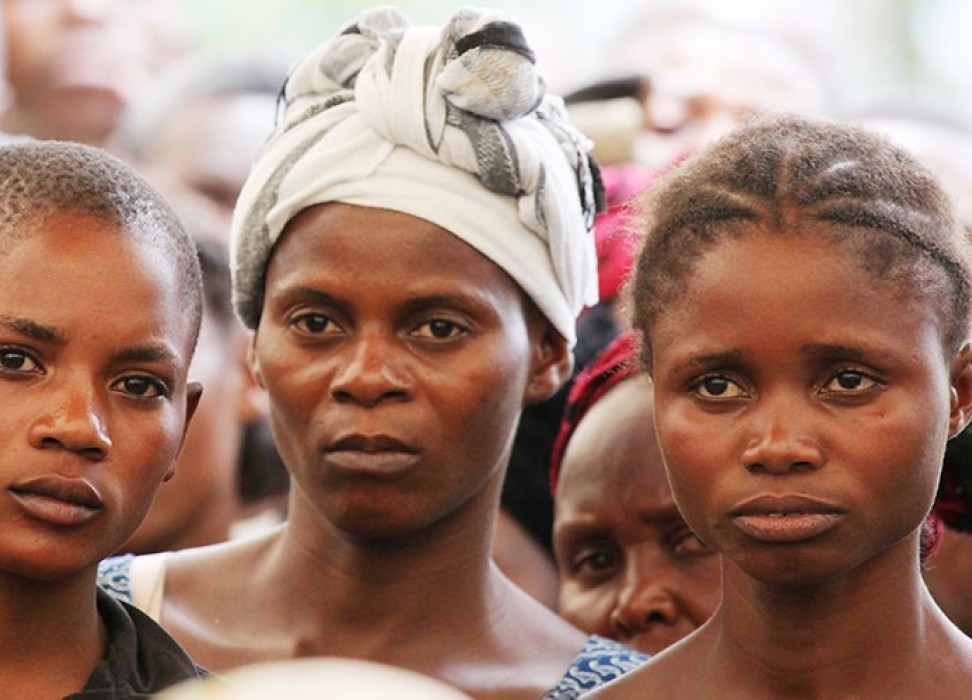
The large compound holds buildings painted in vivid colours. Patients waiting for their turns sit silently on wooden benches lined up in open corridors. Mothers with new-borns and older children, elderly women and a lone, taciturn ageless man ready to meet the counsellors and medical staff.
One would think that the people who visit the compound have the regular ailments one would encounter in any healthcare centre around the globe. However, all of these visitors have a harrowing story to tell.
“One night, unknown assailants entered my village. At that time, I was just outside the village and I was able to hide but I could still see what was happening. The attackers killed my children, my wife, and they looted all of our possessions. I was able to escape and take refuge in Bunia where I received help from my son to set up a small fishing business,” the man was able to share.
“I crossed paths with my village’s attackers once again in Bunia on my way back from fishing. They abducted me and took me to their camp. There, they forced me to rape two women, each in turn, day and night. If I refused, they would threaten and beat me,” he said.
“We spent four days like this, the women and I, without much to eat. One day, my captors sent me to fetch water in the forest; that is when I managed to escape and flee back to Bunia. I did not find my son but I reached the IDP camp in Bunia. This is where I live now and where I was made aware of the work of SOFEPADI.”
The staff at the Karibuni Wa Mama (Welcome, mothers) medical centre help heal many wounds - physical and psychological, and go even further in healing survivors. The centre is managed by the NGO Solidarité feminine pour la paix et le développement intégral (Female Solidarity for Peace and Integral Development) - SOFEPADI.
SOFEPADI was founded 20 years ago by 24 women in Bunia, Ituri, Democratic Republic of the Congo. Their first objective was to campaign for peace and to promote women’s empowerment and human rights. SOFEPADI soon opened another branch in Beni, North Kivu, to join the fight against impunity for sexual violence in both Provinces. A decade ago, they expanded their activities by taking over the medical care of victims of sexual and gender-based violence, an activity previously carried out in the region by Doctors without Borders.
A holistic approach to healing
The staff at SOFEPADI have adopted a holistic approach to healing survivors. A medical doctor oversees general visits, the provision of HIV post-exposure prophylaxis (PEP) and testing, and family planning. Another unit provides psychosocial care to deal with victim’s trauma and rehabilitation, while one more offers vocational training for survivors to help them become financially independent.
“Because of the current situation in Ituri, we are working with internally displaced people. In 2019, we treated 1,305 victims of sexual violence. Among them, half were internally displaced people,” said Noella Alifua, one of SOFEPADI’s coordinators.
“We go in the field with our mobile clinics and treat the displaced where they have ended up. Victims of violence are the majority of those we assist. We treat them free of charge thanks to funds from our partners. Our centre does not generate enough revenue for other field activities,” she added.
The civil war in the DR Congo officially ended in 2003 however, pockets of conflict continue in certain regions of the country. In Ituri, inter-ethnic violence, which erupted in December 2017 has resulted in hundreds of deaths, serious human rights abuses, including brutal acts of sexual violence and the displacement of half a million of people throughout Ituri and neighbouring provinces. Almost 57,000 people have sought refuge in Uganda.
In January 2020, a report by the UN Joint Human Rights Office in DR Congo detailed the violence in Ituri, stating that these abuses may constitute “crimes against humanity.” In an update issued in May, the Office further reported that between 1 October 2019 and 31 May 2020, armed assailants killed at least 531 civilians in Ituri 375 of them were killed since March, when the violence soared.
For SOFEPADI, insecurity has become a big concern, specifically for their mobile clinics that reach survivors in remote areas. Noella recalled that one of her teams narrowly escaped an attack in Mahagi, a territory 170 kilometres Northeast of Bunia.
“What is extremely concerning in conflict zones is that women are the most affected,” Alifua said.
The first steps to justice
Recently, SOFEPADI added a new segment to their activities: providing legal aid for survivors and training for civil society actors on the body of Congolese law criminalising sexual violence; as well as increasing the awareness of members of the judiciary on sexual and gender-based violence.
“It is optional; we only assist those who want justice. We cover all legal costs from start to finish,” Alifua said. “There may be rulings by the courts, but the perpetrators are often people who do not have the means to pay reparations. That is discouraging for victims.”
So far, SOFEPADI has helped file over 1,500 cases against alleged perpetrators in the courts. “We’ve also obtained rulings, but reparations remain a problem,” she pointed out.
Seeing that the outcomes of cases has not always been favourable, some families have opted for out of court settlements with the perpetrators.
For Gloria Malolo, Human Rights Officer with the Joint Human Rights Office in Bunia, reparations primarily bring victims a sense of relief that the harm they suffered has been redressed, but also strengthen the population’s trust in the justice system.
“This is the struggle the Joint Human Rights Office has engaged in, because if a victim tells you that they have no interest in going to court because they know the harm they suffered will not be remedied, you can tell from the start that the victim will not be interested,” she said.
“And this represents a roadblock in a whole system that would normally go in the direction where the victim could recover everything they have lost - morally or physically - and feel they have obtained redress for what they endured.”
In Bunia, the Joint Human Rights Office supports the judiciary in the fight against sexual violence by providing funds to support judicial investigations and Mobile Courts and providing protection for victims and witnesses so that they can participate in the proceedings safely.
The Office’s support in the fight against impunity does not end with the pronouncements of judgments; the Office also advocates for courts and relevant actors to pursue all other possible legal avenues for redress when perpetrators are not able to pay financial reparations.
In this fight against impunity, SOFEPADI is among the first entry points for victims who seek justice. With the aim of uncovering the truth, the staff at Karibuni Wa Mama collect medical details to strengthen cases filed with the courts.
“The victims start at SOFEPADI. They recount the facts of their ordeal and bring elements that allow SOFEPADI to start managing them as patients. When victims arrive with the marks of their injuries, SOFEPADI is able to deliver medical certificates and take photo evidence that could help to uncover the truth,” Malolo pointed out.
“The military or civil court will then use those elements to uncover the truth, since the magistrates will only get the opportunity to listen to the victims months after the events” she added. “
“The traces would have disappeared, even when it comes to rape, the wounds would have healed. But all the elements gathered by SOFEPADI, already at the level of first contact, will allow the judge or the magistrate to find out what happened.”
Video
30 July 2020
